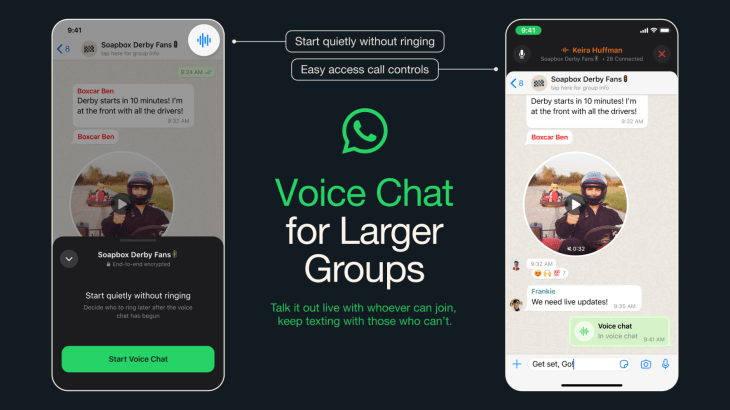WhatsApp, the popular messaging platform owned by Meta, has announced the rollout of a new voice chat feature designed for seamless conversations among large groups. The capability provides an alternative to traditional conference calling by allowing up to 32 participants to join a voice discussion through a less disruptive, silent initiation process.
Minimizing Intrusiveness
A key advantage of the new voice chat feature is reducing the intrusiveness commonly associated with a sudden group call. Rather than ringing every member when a voice chat is started, the system sends a simple notification without any disruptive ringing. Users can join the conversation smoothly at their convenience by tapping an in-chat bubble.
This thoughtful approach prevents voice chats from interrupting busy group members unnecessarily. Those unavailable can easily ignore the notification without hindering the experience for others. WhatsApp’s voice chats promise group communication with enhanced flexibility and consideration.
Streamlined Messaging
Voice chat participants can continue sending messages and viewing chat history even while participating in the call. WhatsApp has conveniently positioned call controls like muting, exiting the chat, or messaging at the top of the screen for straightforward access without leaving the conversation.
This integration of messaging and voice discussion creates a more natural flow for group communication. Members can seamlessly toggle between verbal and text-based participation.
Optimized for Large Groups
 WhatsApp designed its voice chat feature with large communities in mind, supporting up to 32 participants in a single call. This capacity mirrors competitors like Discord and Telegram while exceeding platforms like Apple’s FaceTime.
WhatsApp designed its voice chat feature with large communities in mind, supporting up to 32 participants in a single call. This capacity mirrors competitors like Discord and Telegram while exceeding platforms like Apple’s FaceTime.
For large groups ranging from work teams to social clubs, the tool provides an invaluable channel for engaging in dynamic multi-member discussions. Users can brainstorm ideas, share updates, or simply socialize with the community.
Reinforcing Privacy
As expected from WhatsApp, voice chats utilize end-to-end encryption to protect user privacy. This ensures the conversations remain confidential, inaccessible to outside parties. WhatsApp also does not store any voice chat logs on its servers.
For users accustomed to WhatsApp’s security standards, voice chats represent a natural extension with the same built-in privacy. The encryption further validates the feature’s utility for sensitive group discussions regarding organizational initiatives, team projects or private social conversations.
Gradual Global Rollout
WhatsApp plans a gradual rollout of voice chats over the coming weeks. The initial launch will be available on both iOS and Android, but focused on the app’s largest groups ranging from 33 to 128 participants. This provides WhatsApp the opportunity to monitor performance at scale while refining the user experience.
Once tested with bigger communities, the voice chat functionality will then extend to groups of 32 or fewer members. Smaller groups currently rely on WhatsApp’s existing group call feature to meet their voice discussion needs.
 Voice Chat Innovations in Messaging Tech
Voice Chat Innovations in Messaging Tech
WhatApp’s voice chat introduction reflects wider trends and opportunities for voice-based communication innovation across the messaging technology landscape.
Reducing Friction in Group Interactions
WhatsApp’s less disruptive voice chat notifications demonstrate how messaging platforms can evolve group communication norms to facilitate more organic conversations. Competitors can identify additional ways to make group interactions more seamless.
Voice and Text in Harmony
The integration of voice chats and text messaging opens new possibilities for blending these communication channels. Apps can explore complementary usage scenarios that allow users to toggle between modes seamlessly.
Customization for Community Needs
WhatsApp’s group size capacity highlights the potential for customizing voice chat features to meet the needs of different communities. Companies can tailor options like group sizes, call durations and connectivity to niche use cases.
User Privacy as Imperative
By reinforcing privacy standards in voice chats, WhatsApp underscores user security as a prerequisite for feature adoption. Encryption, access controls and data policies will remain differentiators.
As consumer expectations evolve amidst accelerating technology innovation, WhatsApp’s voice chat feature represents both a competitive offering and a call to action for messaging apps to enrich user experiences through human-centric design.
Recent WhatsApp Upgrades
The voice chat news comes alongside several other updates WhatsApp has rolled out recently across security, account flexibility and shopping functionality.
Dual Account Access
Users can now access two WhatsApp accounts simultaneously on one device. This allows convenient switching between personal and professional accounts without logging in and out.
In-App E-Commerce Boost
WhatsApp has enhanced in-app e-commerce capabilities to let users complete purchases and book services like appointments or travel within the app. This streamlines the shopping experience.
Enhanced Security
An optional extra security layer was introduced through passkey support on Android. Passkeys provide an end-to-end encrypted alternative to passwords for signing into online accounts.
Hidden Chat Feature
 A beta version enables hiding locked chats behind a user-defined code. This added layer of security builds upon existing chat lock capabilities.
A beta version enables hiding locked chats behind a user-defined code. This added layer of security builds upon existing chat lock capabilities.
Two-Step Verification
Two-step verification offers expanded account protection by requiring an extra step to sign in beyond just a password. Users must enter a personal PIN or biometric ID.
Together, these improvements to security, account flexibility, payments and communication demonstrate WhatsApp’s commitment to enhancing the app through customer-focused innovation. As online behavior evolves, the platform is positioned to retained its billions of users worldwide.












